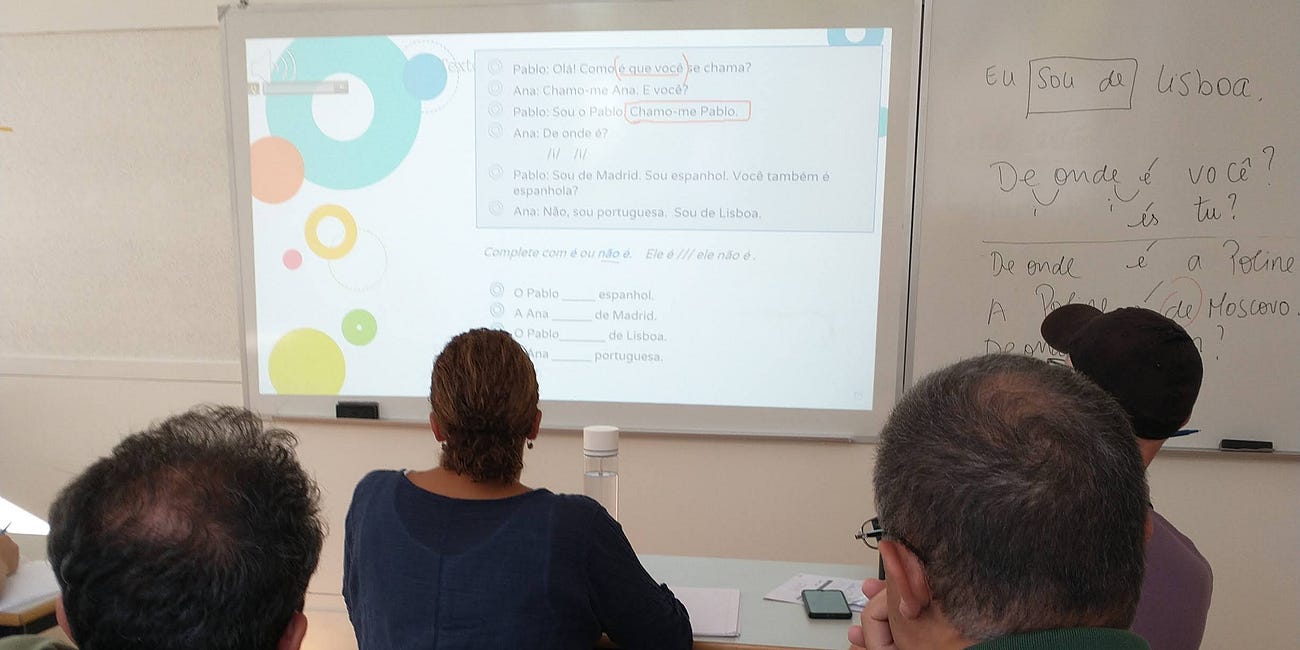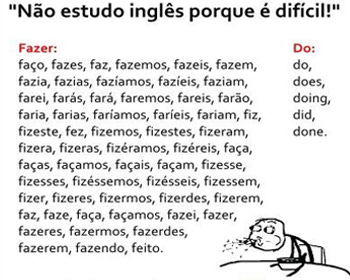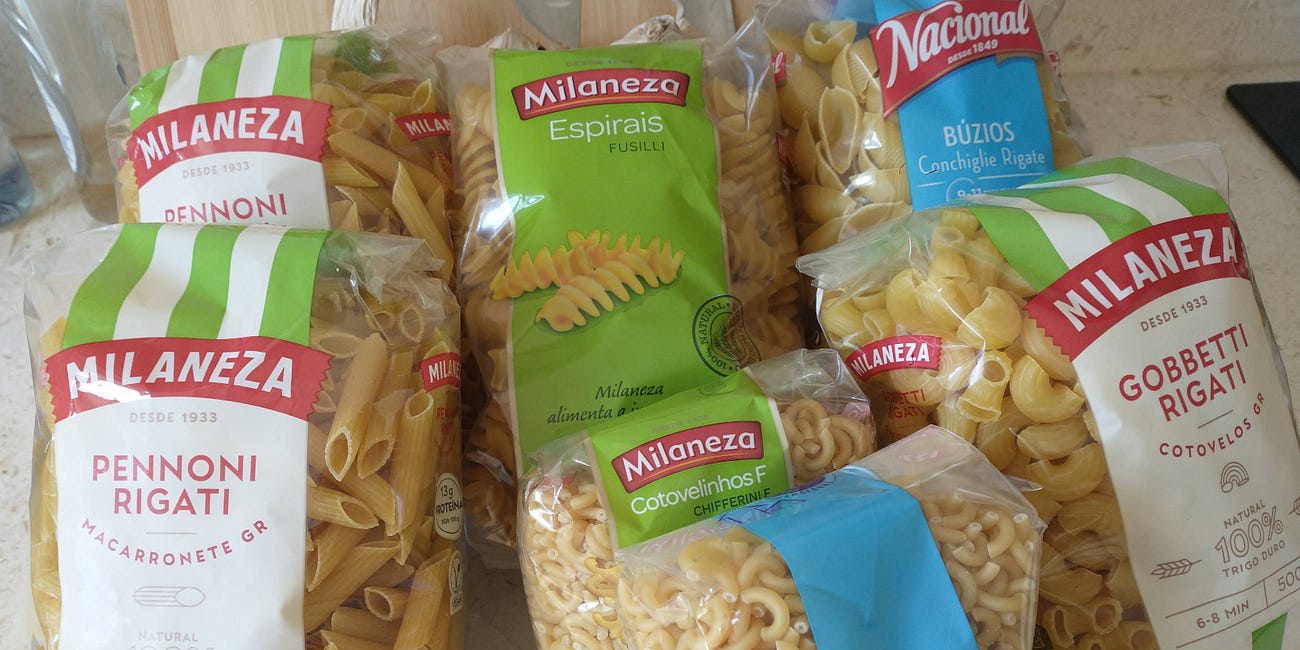Hello. Yeah, it’s been a while.
Not much. How ‘bout you?
Oh wait, I’m here for a reason. Right.
The reason is because there’ve been multiple requests for a report on my latest adventures in Portuguese.1
(And also because I haven’t really been pulling my weight on this blog recently. Admit it, you’ve missed me.)
Those of you who’ve been with us for a while may recall that I took an A1/A2 Portuguese class last fall/winter.
That class was great. The teacher met us where we were, even speaking a few words and phrases in Mandarin for the four Chinese students who began the course with barely more English than they had Portuguese. All 17 of us passed the class and received the coveted “get out of CIPLE free” certificate.
The thing is, while having an A2 level of proficiency is all that’s required for obtaining citizenship or permanent residency status in Portugal, it’s not sufficient for actually using the language. Sure, you can order in a restaurant or understand (most of) what the cashier at the checkout counter is asking you when you buy your groceries,2 but it’s still Caveman Portuguese, just with a larger vocabulary and maybe a few more complete sentences.3
So as that class was winding down I started asking questions about the next level and in January I registered for a spot in a B1/B2 class. And then I waited. Because that’s how things tend to work in Portugal.
I was alerted in July that my A1/A2 class would begin in September. Plenty of notice, which was good since the class met three nights a week for several months. So when I hadn’t heard anything about the B1/B2 class in early September I figured I would have to wait until the following semester.
But on Wednesday, September 11, I got an email informing me I was expected to be sitting in a classroom from 19:30 - 22h (7:30 - 10 pm) Monday - Thursday evenings beginning the following Monday and ending in February. Good thing I hadn’t made any travel plans.
While the lack of notice was concerning, I was thrilled to see I’d have my A1/A2 teacher again. We even met in the same classroom. Walking in on the first day felt like I’d never left.
Just as the A1/A2 class had, our B1/B2 group gelled quickly. We’ve lost two to attrition but the 12 of us who still attend have gotten pretty close. As the first class was, this is an impressive, multi-national gathering. I am the only native English speaker in the class which consists of two students from Iran4, and one each from Norway, Belarus, Ukraine, Russia, Georgia, Turkey, Japan, China, and Paraguay. And while the youngest student in this class - an 18-year-old Iranian - is younger than anyone in A1/A2, this class is a bit older on average.
Professora Maria launched into Portuguese right at the outset and hasn’t looked back. While we still use English every now and then, it’s generally only as a last resort after multiple attempts to explain a concept (usually new vocabulary) fail. I spent the first couple of weeks of class in a daze wondering if I’d made the right choice as I was barely able to follow what was happening.
I realized that my previous experience with a tutor meant that much of the A1/A2 material was at least a little familiar to me so I was one of the more advanced students in class. Most of the learning there, for me, came in the conversations about the textbook rather than from the material in the book itself, conversations which were sometimes in English and - since professora is terrific at using level-appropriate language - sometimes in clear, comprehensible Portuguese.
In B1/B2 I haven’t been understanding as many of those conversations so I’ve often felt a half step behind. Gradually, I’ve gotten better at that, though, so now I’m only in the dark maybe 50% of the time.
As for what we’re learning. That’s … well. Here:
That cartoon, posted by one of my classmates in our group WhatsApp, sums things up pretty nicely. (The caption at the top translates to “I don’t study English because it’s hard!”) In this image there are 59 (!) ways to conjugate the verb fazer (to do) in Portuguese depending on who is/was doing something and when it was or will be done. As of this writing, I recognize 29 of the conjugations.5 That’s less than half of the ways to conjugate one. stinking. verb.
Concepts I understood before have been undermined. Take the word “maybe” as an example. In Portuguese, it’s talvez. Or so I thought. It turns out that’s not exactly true, or at least not completely true. If it’s the only word in a sentence -
Are you planning to study Portuguese today? Maybe.
then, fine, use talvez. But if it is in the same sentence as other words, like those pesky verbs -
Maybe I’ll study Portuguese today.
then the proper translation of maybe is se calher.
Technically, talvez is a word that is used with a class of tenses we haven’t studied yet. We are, apparently, studying indicative tenses. There also exist, apparently, subjunctive tenses. Talvez is the “maybe” we use with subjunctive tenses.6
If you think I understand anything I wrote in the previous paragraph, you would be incorrect. If anything I wrote in the previous paragraph is incorrect, that would not surprise me. I never grasped these concepts back in my high school English classes. They continue to elude me today.
The net effect of all this is that I am feeling less confident about what I know. And, consequently, more reluctant to open my mouth and speak. Which is, I imagine, precisely the opposite of the point.
What I need are safe spaces to practice my speaking skills. So I’m looking into creating some of those. My Portuguese service providers - massage therapist, osteopath, general practitioner - are all excited that I’m taking this class. Each has threatened me recently with a cheery version of, “next time we meet we’ll speak only in Portuguese” as I headed out the door. I should call their bluff. It’ll be a speed bump in our conversations but if I can’t manage that environment how will I ever find the soybeans?
That’s all for now.
Love from Lisbon,
Scott
Granted, those requests have all come from the person with whom I share a T2 with a view but I’m sure the rest of you would be clamoring as well if you had the same access.
You’re on your own, though, if you need to find out where the soybeans are hiding.
Depending on how you feel about actually using, like, verbs and stuff.
one of whom was in my A1/A2 class
Note that recognize is (quite) different from understand when to use.
Which we may not get to before the course is over. I think. Talvez.







I think it shows great commitment that you're sticking with it even when it's so difícil. That means you will eventually succeed, and hopefully by the end of the course a lot of it will have "collapsed into place" in your brain.
And yes, I'm one of those people who loves to hear about your adventures in Portuguese and life in general! Thank you for spending the weekend with us while we were there, instead of studying :)
I feel for you brother. I was a Spanish major in college (which really helped when I took Portuguese in my senior year after a year studying in Spain) and, even with a young brain, the process was difficult. A lot of it is just rote memory, which, as you know, becomes more difficult as we age. But, tal vez, someday it will just click. One thing I found while studying in spain was that it seemed that the more I drank the better my spanish became.